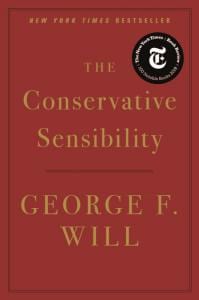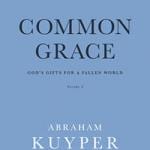
In 1953, Russell Kirk published the groundbreaking The Conservative Mind: From Burke to Eliot. In this book, Kirk set out to articulate the inarticulable–what it is that binds conservatism into a coherent worldview. Three years later Peter Viereck published his much-less-groundbreaking book Conservative Thinkers from Adams to Churchill attempting to do the same thing as Kirk in a more manageable form (~200 pages, about half of which is excerpts from classic conservative texts; as compared to Kirk’s 500+ page survey of conservatism). In both cases, the argument is made that there is something inexpressible about being a conservative. Later writers would talk of conservatism as an inherent ‘disposition’, rather than a carefully reasoned system of ideas and policy positions.
Clearly George Will is aiming to add his voice to these earlier conservative voices with his new book The Conservative Sensibility. Yet he is also standing slightly at odds with these earlier voices. Will writes:
“European conservatism has generally sought to conserve institutions and practices, such as social hierarchies and established churches, that were produced by the slow working of historical processes spanning many centuries. American conservatism seeks… to conserve or establish institutions and practices conducive to a social dynamism that dissolves impediments to social mobility and fluidity. So American conservatism is not only different from, it is at bottom antagonistic to British and continental European conservatism. The latter emphasizes the traditional and dutiful, with duties defined by obligations to a settled collectivity, the community. Because American conservatism is about individual liberty, it cultivates spontaneous social order and hence encourages novelty.” (xxviii-xxix)
Both Viereck and Kirk would disagree–each clearly placing American conservatism on a wider spectrum that includes thinkers from other nations and cultures (though the two disagree as to who exactly fits into the movement). They would have identified what Will defends more as ‘classical liberalism’ or even outright ‘libertarianism’ than as a kind of conservatism. I don’t want to push this point too hard, both because there has always been a classically liberal streak in the American style of conservatism (to defend Will’s definition) and because as the book goes on it become clear that his ideas concerning culture, history, institutions, and tradition (especially in the third, sixth, seventh, and tenth chapters) are much more in line with Kirk, Viereck, and conservative European thinkers than Will would like to admit in his preface.
All that to say, this is a work that brings together an inherent conservative sensibility and an explicit classically liberal sensibility. Which is entirely appropriate for a conservative like George Will who has a worldview forged in the mid-to-late 20th century under the aegis of figures like William F. Buckley, Irving Kristol, and other great minds of American conservatism.
As for the book itself, it’s maybe a touch longer than it really should have been. I say this with the full understanding that George Will is a better writer on his worst day than I am on all my best days together. Still, this book could have said what it needed to say in two hundred fewer pages and not necessarily have been the worse for it.
That said, The Conservative Sensibility is still worthwhile, particularly Will’s chapter on religion. Must one have a theistic worldview in order to be a conservative? The answer is clearly ‘no’, give that Will himself is an atheist and is a conservative. And yet, most conservative intellectuals are quite clear about the religious foundation of the conservative worldview. Heck, Kirk makes it the very first “canon of conservatism” in the first chapter of The Conservative Mind. Will responds by walking back our sense of the divine into a sense of “wonder” at existence, specifically at the complexity and beauty of the natural order and at the apparently spontaneous coherence of mankind’s place within that order. Will argues that embracing the apparent truth of, say, Darwinism need not have the effect of automatically reducing mankind to little more than a complex animal. Instead, it can give us a yet greater sense of wonder that something so incredible as man crawled out of the primordial goop. That the apes may be distant genetic cousins need not devalue the beauty of human achievements.
What’s more, will may very well be right. At least, so far as conservatism is concerned. It may be that he is right and Kirk was wrong and that one can embrace a secular humanist worldview and still retain the conservative sensibility. That such happens rarely is no counterargument so long as it does happen and has defenders like George Will. Obviously as a Christian I find Will’s perspective at the very least deficient, and generally a deeply sad perspective. It may be that we can close our eyes to the coming judgment, embrace the ‘whirl’ of a universe without an ordering Providence, and live a decent life according to the conservative sensibility (or the progressive sensibility, for that matter). But I’d not encourage it. Doing so involves suppressing a part of human existence that Will is clearly quite aware of: the sense of coming judgment–the sensibility that there is something more to good and evil than what people have devised in civilization as we have built cathedrals and airports and nature preserves. Morality isn’t founded on the primordial muck, whether we crawled from it first or not. As he says elsewhere even in this book, there is something universal and lasting about human nature. And as long as that is the case (and it will never not be the case), any view of the cosmos which fails to account for that–as atheistic views ultimately most if they are to be even remotely consistent–must ultimately collapse in on itself.
Which again isn’t to negate the value of The Conservative Sensibility. It is certainly a book worth having on your shelf if you’re interested in conservatism as understood as one of its ablest living champions.
Dr. Coyle Neal is co-host of the City of Man Podcast and an Associate Professor of Political Science at Southwest Baptist University in Bolivar, MO












